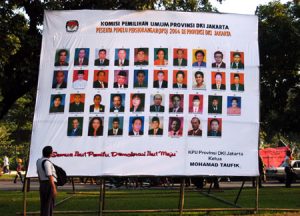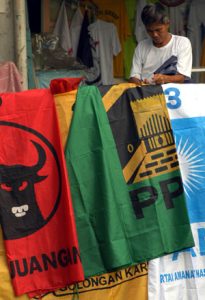Memo #178
By Geoffrey Macdonald – GPMacdonald [at] gmail.com
 Portrayals of Indonesian political parties have classified them as either secular or Islamic. This implies that they hold strong core commitments. But Indonesian parties do not espouse a coherent political program during elections. Islamic and secular-nationalist parties alike appeal to the public with populist slogans. Controversial religious issues, such as the role of Sharia law or the status of the Ahmadiyah Islamic sect – which could differentiate parties along clear secular-religious lines – are ignored on the campaign trail. Contrary to mainstream analysis, religion plays a minimal role in Indonesia’s party competition.
Portrayals of Indonesian political parties have classified them as either secular or Islamic. This implies that they hold strong core commitments. But Indonesian parties do not espouse a coherent political program during elections. Islamic and secular-nationalist parties alike appeal to the public with populist slogans. Controversial religious issues, such as the role of Sharia law or the status of the Ahmadiyah Islamic sect – which could differentiate parties along clear secular-religious lines – are ignored on the campaign trail. Contrary to mainstream analysis, religion plays a minimal role in Indonesia’s party competition.
Indonesian political parties do not produce political platforms, which leaves only the debates and campaigns to decipher each party’s ideological orientation. Yet during the 2009 election’s presidential and vice-presidential debates, the candidates agreed on virtually every major issue. President Yudhoyono’s “pro-people development program” was hardly distinguishable from challenger Megawati’s “people’s economy program.” Afterward an Indonesian political observer described the competing tickets as “three yins with no yang.”
The campaign was equally hollow. There were 34 unique topics discussed by candidates from the 38 competing parties. The economy and development were most prominent during the parliamentary and presidential campaigns, constituting 21 per cent and 25 per cent of the rhetoric respectively. Both campaigns also featured identical promises on education, anti-corruption, pluralism, and service delivery. Significantly, less than 5 per cent of the combined campaign rhetoric addressed Sharia law or other religious issues (for or against).
The absence of religion during election campaigns shows that Indonesian parties are committed to neither secularism nor Islamism. They express no ideological core. While religion serves as a nominal distinction between parties, it in fact tells us little about their programmatic positions.
By focusing on the purported religious basis of parties’ appeals, observers obscure deeper challenges to Indonesian democracy. The lack of party competition around ideological or policy differences saps elections of vibrant debate and renders party identity meaningless. The country’s election laws are biased against smaller parties that could challenge this status quo. Though dominant parties resist changing the rules, electoral reforms – such as lowering the vote threshold – should be implemented to allow more parties access to electoral competition.
About the Author:
Geoffrey Macdonald is a Ph.D. Candidate at the Josef Korbel School of International Studies at the University of Denver. He was recently awarded a Fulbright Scholarship to continue his research on the politics of deeply divided societies.
Links:
- Islam and Party Politics in Indonesia: An Assessment of the 2009 Election, The Indonesian Quarterly, 2011. (By Geoffrey Macdonald)
- Indonesia’s Place in Global Democracy, Problems of Democratization in Indonesia: Elections, Institutions, and Society, 2010
- Muslim Indonesia’s Secular Democracy, Asian Survey, 2009
- Indonesia’s Accountability Trap: Party Cartels and Presidential Power after Democratic Transition, Indonesia, 2004.
- Political Islam and Islamic Parties in Indonesia: Critically Assessing the Evidence of Islam’s Political Decline, Contemporary Southeast Asia, 2010.
- Islamic parties ‘must’ form coalition to survive in 2014, The Jakarta Post, 2012
- Political Islam in Indonesia: Present and Future Trajectory, Asian Survey, September/October 2004.
Related Memos:
- Our other Memos on Indonesia and Southeast Asia.
- Indonesia’s Unconsolidated Democracy: Prelude to 2014 (Memo #163 by Matthew J. Bock)
- The Indonesian Model: Learning from a Muslim Majority Democracy (Memo #86 by Nathan Allen)

